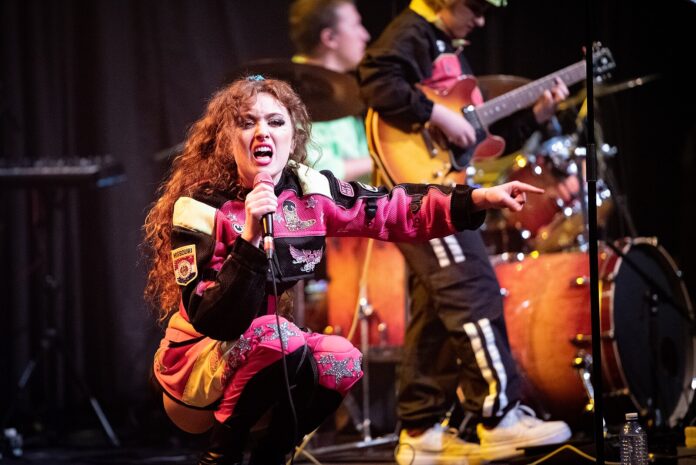Chappell Roan’s unique approach to pop stardom raises questions about social expectations for performing artists
By JULIE HUANG – arts@theaggie.org
Performing artists are known for having intense, complicated and often highly parasocial relationships with their fans. Recently, the question of how much information performers owe their fans about their personal lives and beliefs has been raised, as standards surrounding appropriate behavior for both public figures and their fans grow increasingly unclear.
This uncertain situation is best exemplified by pop singer-songwriter Chappell Roan, whose current circumstances as a rising public figure generate discussion about her controversial attitude toward her fame.
Roan recently faced backlash over the cancellation of her All Things Go festival appearances as well as her refusal to publicly endorse any candidate for the 2024 presidential election. This response is a reflection of society’s most prominent values and how they manifest within celebrity culture.
Supported by swaths of people eagerly consuming, analyzing, appreciating and criticizing their artistic creations, performing artists with large fan bases wield massive amounts of influence on what is deemed culturally current and significant.
The potential of that cultural power creates the expectation that celebrities should take advantage of it. From referencing the names of their favorite beauty products to the names of the candidates that they will be voting for on election day, endorsements have become so commonplace that they are woven into the fabric of culture itself.
Roan’s statement that there are “problems on both sides” of the 2024 presidential ticket transformed what could have been a clear-cut political endorsement into something less straightforward. In doing so, Roan rejected the expectations placed on performing artists to package their personal beliefs into something easily consumed and digested by the general public.
By expressing more complex views, Roan publicly upholds a sense of personal identity that is expected of the general public to maintain but rarely feasible for performing artists whose identities are usually subsumed into the aesthetics, products and lifestyles that they are associated with.
Roan’s attitude toward the presidential election builds off of previous statements where she explicitly acknowledges the difference between her public image and her personal identity, asking fans not to harass her if they see her out in public.
The introduction of uncertainty into a traditionally accepted dynamic between pop star and fan seems to be unintentional on Roan’s part. However, intention does not factor into the resulting circumstances. Those who expected a certain course of action based on Roan’s previously established brand are blindsided by her decisive refusal to allow the public to project a certain image onto her, causing frustration and controversy.
This controversial situation suggests that celebrity culture has evolved to a stage where performing artists are now expected to perform their chosen public persona at all times. This expectation invites criticism whenever they stray from that image.
The increasing need for performing artists to always be exactly what they seemed to promise may stem from public desire for celebrities to represent the prevailing social, cultural and political values of the day. When a performing artist says what everyone’s thinking, it creates a sense of cultural unity. When a performing artist leans into an aspect of their personal identity as part of their brand, it seems to uplift everyone who shares that identity.
It is undeniable that their cultural influence often can and does create positive effects in society. However, the expectation that performing artists strive constantly to become the living embodiment of certain beliefs and values ultimately creates an unsustainable cycle in which performing artists are encouraged to simplify their personal beliefs for mass consumption, and fans are encouraged to disregard nuance in favor of listening to what a celebrity tells them.
In an era where it becomes increasingly difficult to understand how much celebrities should disclose and how much fans should care, the individuality of both the performer and consumer are at risk of being consumed by fame.
It may also be important to note, however, that the emotions and attitudes that fuel celebrity discourse remain as transient as ever and do not always represent everyone. Despite her controversial situation, Roan recently performed at Austin City Limits Music Festival to throngs of cheering crowds, proving that her star power has not yet dimmed.
Written by: Julie Huang — arts@theaggie.org






